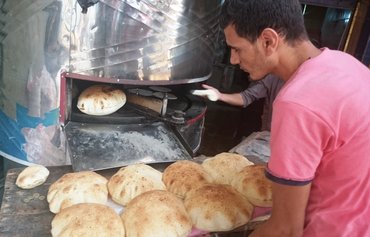Egyptian authorities are taking precautionary measures to stem the wave of rising prices that hit the Egyptian market in recent months.
The measures, introduced at the beginning of the year, include steps to prevent price manipulation and an increase in the number of food outlets run by the Ministry of Supply and Internal Trade and the Armed Forces, which are offering items at very competitive prices, officials tell Al-Mashareq.
Merchants are manipulating prices by hoarding large quantities of basic food items and using similar tactics to manipulate foreign currency prices, said Sami Gheit, a researcher with Al-Sharq Centre for Regional and Strategic Studies.
Security agencies affiliated with the Egyptian police in co-operation with the Ministry of Supply’s Investigation Bureau carried out dozens of raids on warehouses of merchants who hoarded merchandise to sell on the black market, he said.
Additional quantities of basic consumables also were made available to control the market and rising prices, he said.
Curbing price manipulations
The Ministry of Supply and Internal Trade "deployed many mobile kiosks in all Egyptian provinces to sell food items, meat, fish and fowl at competitive prices", said Amr Mukhtar, director of the ministry's chamber of planning.
The aim is to help "the average limited-income citizen cope with the current reality of rising prices", he told Al-Mashareq.
"For example, the price of one kilogramme of meat in the supermarkets is more than 80 pounds [$4], and as high as 120 pounds [$7], but stands at only 50 pounds [$3] at the [ministry's] outlets, a price that is not much different from what it was before the wave of rising prices," he said.
The ministry is also closely controlling the distribution of subsidised food that citizens can obtain at very low prices, Mukhtar said.
"Thousands of ineligible beneficiaries have been taken off the lists and scores have been prosecuted for holding forged [subsidy] cards or selling their cards on the black market in complicity with some merchants," he said.
In addition to intensified market monitoring patrols, Egyptian authorities also are cracking down on currency exchange shops after the Central Bank’s decision to liberalise the exchange rate of the Egyptian pound, said Raed al-Salamouni, a market inspector in Cairo.
"Dozens of currency exchange shops have been shut down for violations and attempts to manipulate exchange rates," he told Al-Mashareq.
Al-Salamouni said that through his interaction with Egyptians on a daily basis, he noticed that mobile and fixed sales outlets have indeed alleviated the situation for the average citizen.
The monitoring patrols deployed by the Ministry of Supply also have had an impact on curbing attempts to exploit the situation, he added.
Absorbing youth in new jobs
It was clear during the recent period that "many terrorist groups including the 'Islamic State of Iraq and the Levant' (ISIL) and others, tried hard to keep conditions in Egypt unstable", Al-Sharq Centre's Gheit said.
"One of the most important gaps that terrorist ideology uses to infiltrate any society are [tough] economic conditions and the resulting social instability," he said.
"Those who espouse terrorist ideas brainwash youth to incite them against the ruling authorities and goad them to carry out terrorist acts to express their anger," he added.
Thousands of job opportunities were created in recent months, he said, with the establishment of massive projects in many provinces, particularly in the Suez region along the new canal.
The excavation works, construction of residential complexes, digging of tunnels, establishment of fish farms and logistics centres for ship maintenance "have provided jobs to thousands of young Egyptians of all specialisations who are native to the region, as well as those from other provinces", he said.
"Many smart villages and cities have been built in Upper Egypt provinces such as Sohag and Assiut, to provide job opportunities to the people of the region and stop their migration to Cairo in search of work," he said.
These measures helped "instill a sense of reassurance and safety in the provinces, cities and villages of Upper Egypt", Gheit said.

![The Ministry of Supply has distributed mobile kiosks to provide basic commodities at discounted prices to help Egyptians cope with rising prices in the markets. [Waleed Abu al-Khair/Al-Mashareq]](/cnmi_am/images/2017/04/06/7572-Egypt-food-prices-600_384.jpg)






